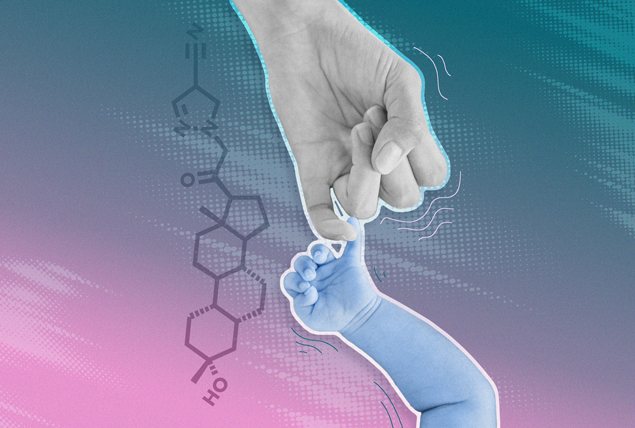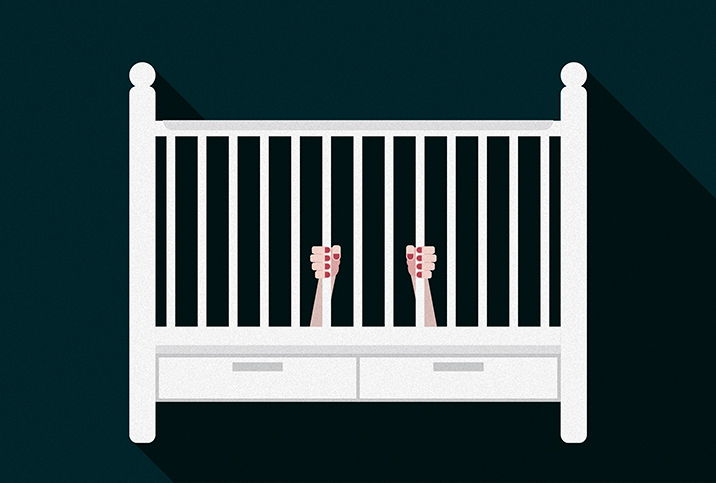FDA Approves First Pill for Postpartum Depression

The Food and Drug Administration has approved the first pill for postpartum depression (PPD) in the United States. Postpartum depression is a serious mental illness affecting about one in seven birthing people.
PPD can be debilitating and usually occurs in the weeks or months after giving birth. It's also possible to have postpartum depression after a miscarriage.
What is the new postpartum depression pill?
The drug, called zuranolone, is a once-daily pill taken for two weeks, according to a press release. Unlike general antidepressants, which can take two weeks or longer to take effect, zuranolone can begin to alleviate depression after just three days, according to clinical trial data.
Its effects can last for at least 42 days after the final dose.
Before this, the only specific treatment for postpartum depression was brexanalone in 2019. This postpartum depression medication works within 48 hours but requires a 60-hour IV infusion provided at a healthcare facility, according to the manufacturer's website.
Potential brexanalone side effects included a loss of consciousness, and it cost an average of $34,000, according to the New York Times.
"Postpartum depression is a serious and potentially life-threatening condition in which women experience sadness, guilt, worthlessness—even, in severe cases, thoughts of harming themselves or their child," said Tiffany R. Farchione, M.D., director of the Division of Psychiatry in the FDA's Center for Drug Evaluation and Research in a statement.
"And, because postpartum depression can disrupt the maternal-infant bond, it can also have consequences for the child's physical and emotional development," Farchione said.
Why is having a pill for PPD important?
About one in five childbearing people in the U.S. experience a maternal mental health condition, such as PPD or postpartum anxiety, and suicide is the leading cause of death in the postpartum period, said Perri Shaw Borish, M.S.S., L.C.S.W., founder and psychotherapist at Whole Heart Maternal Mental Health in Philadelphia.
"Having access to an oral medication will be a beneficial option for many of these women coping with extreme, and sometimes life-threatening, feelings," Farchione said.
PPD can persist for months or years without intervention, according to the National Institutes of Health (NIH). About five percent of people report having PPD three years after giving birth.
Zuranolone and its intravenous predecessor take effect quicker than other antidepressants because they target the distinct biological underpinnings of PPD, said Jill Zechowy, M.D., physician and psychotherapist at Women's Mental Health, MD in Santa Rosa, California.
"PPD is different from other types of depression. It occurs in response to the extreme changes in hormones and lifestyle that come with becoming a mother," Zechowy said. "These hormonal changes, specifically the drop in allopregnanolone, put women at risk."
By highlighting these biological factors, the new drug could also help alleviate shame surrounding PPD, Zechowy said.
There's a myth about motherhood that suggests birthing people should self-sacrifice for their children, love every moment of parenthood and never complain or experience negative emotions, Borish said.
Parents who cannot uphold that myth tend to feel a tremendous amount of shame and self-blame and struggle to ask for help, Zechowy and Borish said.
A similar stigma surrounds other forms of depression and mental illness generally, which can make some people reluctant to take antidepressants. Zuranolone is essentially a synthetic hormone, and only needs to be taken for two weeks, rather than several months, because of this, more people might be willing to seek treatment, Zechowy said.
How does zuranolone work?
General antidepressants alter neurotransmitters such as serotonin, dopamine and norepinephrine. Zuranolone, by contrast, is a neuroactive steroid that replaces allopregnanolone, said Zechowy and Candice Wood, M.D., OB-GYN and founder at Woman Made Well based in Phoenix.
Levels of allopregnanolone, a natural metabolite or progesterone, rise dramatically during pregnancy and drop precipitously after birth, said Zechowy and Sarah Oreck, M.D., a reproductive psychiatrist in Los Angeles.
Allopregnanolone regulates GABA levels, a neurotransmitter that plays a role in several essential functions, including sleep and mood. Low GABA activity is associated with anxiety, depression and insomnia, among other issues, Wood and Zechowy said.
By binding with certain GABA receptors, zuranolone increases GABA activity, which can help to boost mood and alleviate anxiety.
Who is (and isn't) a good candidate for the drug?
People with severe, crippling depression, those without access to long-term psychiatric care and those who haven't responded to other treatment methods are likely to benefit most from this treatment, Wood, Oreck and Zechowy said.
Those who have had success working with a postpartum depression therapist or taking medications, such as selective serotonin reuptake inhibitors (SSRIs), should continue, they said. The new pill does not warrant a medication change if current methods to treat postpartum depression are working.
Because the clinical trials predominantly studied people with severe PPD, it's not yet clear whether it will be more beneficial than other treatments for those with mild or moderate PPD, Oreck said.
More research is also needed to determine if it is safe for those with more complex histories, such as bipolar disorder, and whether it will be effective for people who've had PPD for more than a year after giving birth.
It's not known whether it's safe for breastfeeding people, so those who are will need to "pump and dump," Zechowy said.
What are the potential risks of taking zuranalone?
The drug contains a "black box label," warning of possible hazards, including fetal harm, according to the FDA. Pregnant people shouldn't take zuranalone, and those who aren't pregnant will need to use contraception while taking it and for one week after stopping.
Additionally, it is not safe to drive or operate machinery within 12 hours of taking zuranalone, and, like any antidepressant, it can potentially worsen depression and elicit suicidal thoughts or behaviors.
The bottom line
It's exciting to see research and funds devoted to addressing birthing people's mental health problems, particularly because this population has long been omitted from drug studies, Oreck said.
Still, zuranalone isn't a silver bullet. It doesn't address various risk factors for PPD–such as prior trauma, lack of social or familial support or poverty, nor does it negate the importance of a holistic approach, including therapy and postpartum depression self-care, Oreck and Zechowy said.
"We live in a culture that seeks an easy fix, and it would seem that this pill could fall into that category," Oreck said. "This medication, like those before it, is just one tool in our mental health toolbox to be combined with evidenced-based therapy and support."
If you are experiencing PPD, it's important to know you're not alone, Wood said.
Talk with your doctor or a mental healthcare professional as soon as possible. You can also speak with someone immediately by calling the international postpartum support helpline at 1-800-944-4773. Seek out a PPD support group. If your depressive symptoms become overwhelming, call 911.


















